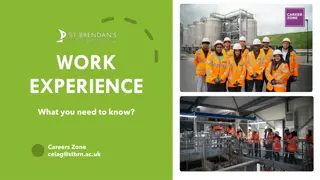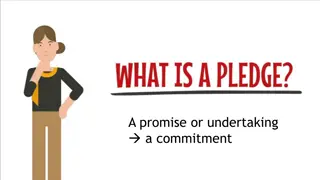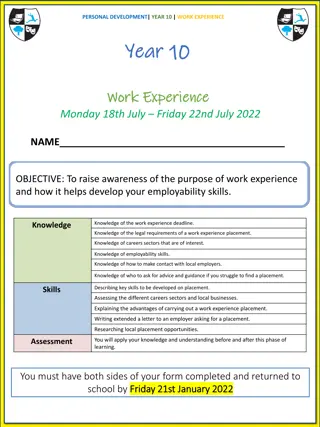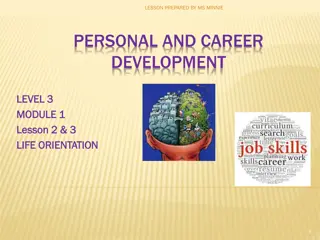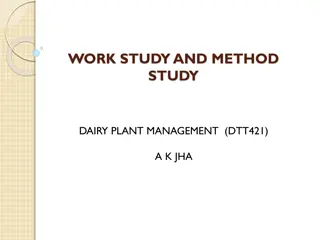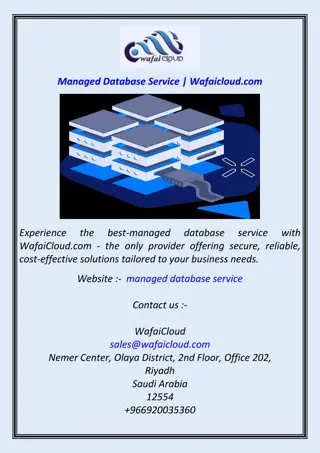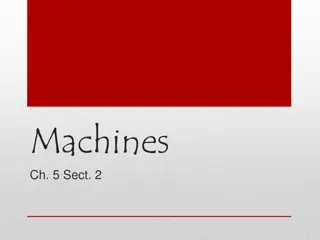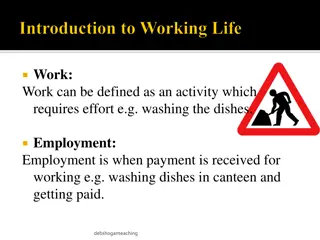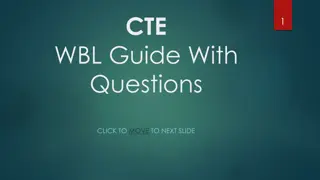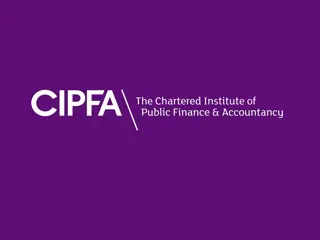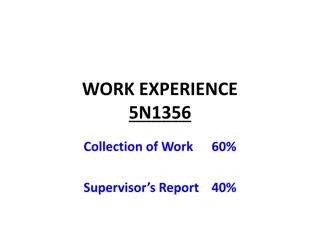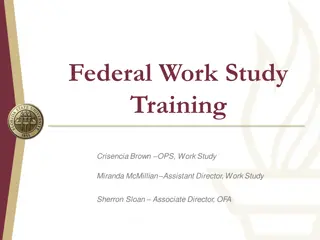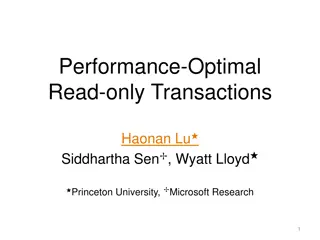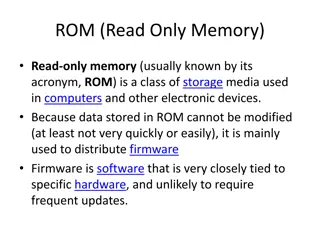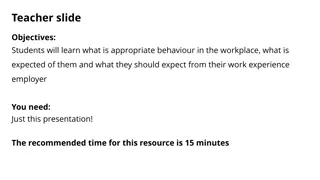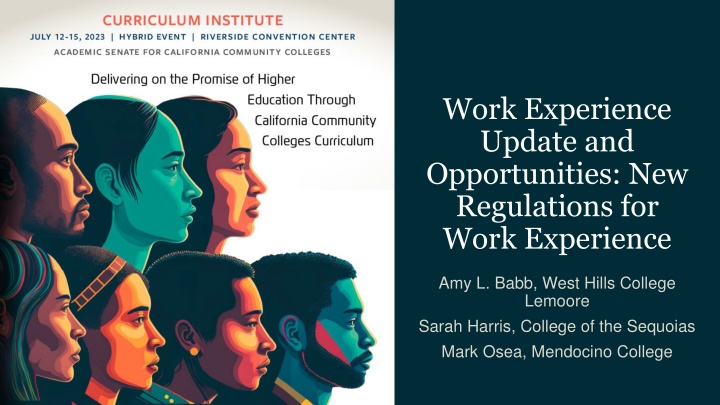
New Regulations and Opportunities for Work Experience Education
Explore the latest updates and opportunities in work experience education with the recent amendments to regulations, focusing on integrating high-quality work experience into instructional programs. Learn how California's community colleges are advancing workforce development and promoting social and economic mobility through career education initiatives and work-based learning. Join the session to understand the impact of these changes on work experience curriculum at your college.
Download Presentation

Please find below an Image/Link to download the presentation.
The content on the website is provided AS IS for your information and personal use only. It may not be sold, licensed, or shared on other websites without obtaining consent from the author. If you encounter any issues during the download, it is possible that the publisher has removed the file from their server.
You are allowed to download the files provided on this website for personal or commercial use, subject to the condition that they are used lawfully. All files are the property of their respective owners.
The content on the website is provided AS IS for your information and personal use only. It may not be sold, licensed, or shared on other websites without obtaining consent from the author.
E N D
Presentation Transcript
Work Experience Update and Opportunities: New Regulations for Work Experience Amy L. Babb, West Hills College Lemoore Sarah Harris, College of the Sequoias Mark Osea, Mendocino College
On Zoom: Use the chat feature in Zoom. One of our presenters will monitor chat and address questions or raise them with the group. On Zoom: Please make sure your mic is muted! If you wish to speak, use raise hand and wait to be called on to unmute. In Room: Please keep cross-talk to a minimum so online attendees can follow the conversation. In Room: Raise your hand and be sure to speak up when called on! Panelists will repeat your question/comment or run a mic to you. All: Please be patient and with us and your colleagues as we navigate this hybrid experience together. In the Room and on the Zoom 2
Amendments to the Work Experience regulations approved by the Board of Governors in July 2022 to Work Experience Education (renamed from Cooperative Work Experience) allow for the integration of high-quality work experience opportunities as a part of the learning process for an expanded range of instructional programs. In addition, the updated regulations allow for student educational and occupational goals, including developing career awareness, learning industry culture, and developing professional networks in their career field. Join this session to learn about updates to the regulations and how they may impact work experience curriculum at your college. Session Description 3
Californias community colleges are at the forefront in combating income inequality and are trailblazers in supporting social and economic mobility. Each year, CCC s provide hundreds of thousands of students with the career education and training needed to secure good-paying jobs. Equity and Work Experience Our system is leading the way in California s efforts on workforce development by partnering with industry and labor to create innovative skills-building and supporting initiatives to expand career education opportunities. Vision for Success 4
Work-Based Learning in California Community Colleges Work-based learning is an educational strategy used to connect classroom instruction to careers by providing students with opportunities to reinforce and make relevant their classroom experiences. It also allows students to explore potential careers through immersion in their fields and, most importantly, to apply their learned skills in an authentic setting. INTENT: Expand opportunities for students Support the student experience Changes to and confusion of work experience for students Need for work experience for students and employers Need for universal aspects of a work experience program 5
Work Experience Regulation Update Timeline Revised Title 5 Work Experience Regulations Approved by BOG July 2022 Awaiting Chaptering and CCCCO Guidance Text of Updated Regulations 6
Revisions General Simplify regulations to allow local districts to increase work experience opportunities for students and expand beyond a strict focus on CTE programs. Existing regulations include onerous and archaic requirements that stifle innovation and expansion of work experience Rename from Cooperative Work Experience to Work Experience Education Establish new numbering for all of Article 4 on Work Experience Education, previously organized as 55250 55257 with revised regulations organized as 55250 55254. Collapses 14 existing separate sections into more intentionally organized and sequenced 5 sections. 7
Revisions Alignment with System Goals The revision to regulations is structured to align with equity imperatives, including: Expanding opportunities for students to engage in experiential learning through work experience education Integrating high-quality work experience opportunities as a part of the learning process and expanded range of courses and instructional programs Revisions ensure implementation supports equitable action and completion: Emphasize and support paid opportunities for EDS students; Prioritize high-need students 55251(E) includes a district responsibility to analyze disaggregated data on work experience enrollment, persistence, and course success related to degree and certificate attainment. This requirement incorporates credit and noncredit. Emphasize a focus on building students social capital Ensure students with jobs are not excluded; supports CPL 8
Revisions Highlights Impacting Curriculum Specifically permits noncredit work experience education and calls for disaggregated data on enrollment and student success inclusive of these courses Removes requirement for "Local Plan" and replaces with requirement for local board policy and procedures. Removes distinction between "Occupational" and "General" work experience Revises and simplifies credit hour calculation for work experience 9
Updated Regulations: Units/Hours Updated Regulation: 55253 (a): (a)Units of credit for work experience education shall be calculated as follows: (1) work experience education offered as a credit course: one semester unit of credit will be awarded for every 54 hours of work experience, or one quarter unit for every 33 hours of work experience, or the equivalent locally determined minimum threshold for awarding one unit of credit as codified in local board policy or procedure. Units of credit may be awarded in increments of .5 units; and (2) work experience education integrated as a component of a course: units of credit will follow standards for credit hour calculations in section 55002.5 for all activity, lab, or other instructional course components. Units of credit for the work experience component shall be calculated according to the formula in subparagraph (1). Previous Regulation: 55256.5 (c): The following formula will be used to determine the number of units to be awarded: (1) Each 75 hours of paid work equals one semester credit or 50 hours equals one quarter credit. (2) Each 60 hours of non-paid work equals one semester credit or 40 hours equals one quarter credit. (3) Units may be awarded in 0.5 unit increments. 10
Updated Regulations: Total Units Previous Regulation: 55253(a): For the satisfactory completion of all types of Cooperative Work Experience Education, students may earn up to a total of 16 semester credit hours or 24 quarter credit hours, subject to the following limitations: (1) General Work Experience Education. A maximum of six semester credit hours or nine quarter credit hours may be earned during one enrollment period in general work experience education. (2) Occupational Work Experience Education. A maximum of eight credit hours may be earned during one enrollment period in occupational work experience education. Updated Regulation: 55253(c): A maximum of fourteen semester credit hours or twenty-one quarter credit hours may be earned during one enrollment period in work experience education. Students may repeat a work experience education course subject to section 55040. 11
Updated Regulations: General/Occupational Previous Regulation: 55252: Cooperative Work Experience Education is a district-initiated and district-controlled program of education consisting of the following types: (a) General Work Experience Education is supervised employment which is intended to assist students in acquiring desirable work habits, attitudes and career awareness. The work experience need not be related to the students' educational goals. (b) Occupational Work Experience Education is supervised employment extending classroom based occupational learning at an on-the-job learning station relating to the students' educational or occupational goal. Updated Regulation: This distinction is removed all work experience education follows the same requirements. 55250(a) defines the purpose of work experience in part as: The purpose of work experience education is to provide students with an integrated instructional program that provides opportunities to connect academic curricula to applied experiential learning in the workplace. Work experience education should be substantive in nature, linked in a way relevant to a student s educational pathway, and contribute to demonstrable learning outcomes that have value towards a degree or certificate. 12
Updated Regulations: Noncredit Updated Regulation: 55250(b) defines work experience and explicitly allows noncredit instruction and instruction as part of a course: Work experience education within the California Community Colleges involves student employment and/or internships selected, approved, and supervised by districts to provide meaningful work experiences related to the course of study, or specific career pathway training, combined with instruction in critical workplace skills. Work experience education may include paid or unpaid employment, full or part-time employment, and may be structured as separate credit or noncredit classes, or integrated as a component of a course. It should be integrated as part of a student s educational pathway allowing students to achieve both educational and occupational goals. It should also assist the student in developing career awareness, learning industry culture, competencies and norms, and developing professional networks in their desired field to support career mobility. Work experience education should provide economically disadvantaged students with opportunities to earn a wage while completing program requirements and earning academic credit. Previous Regulation: Did not explicitly include noncredit instruction 13
Updated Regulations: AP/BPs Previous Regulation: Required a District Plan approved by the Governing Board. 55251: (a) The district plan shall contain the following provisions: (1) A statement that the district has officially adopted the plan, subject to approval by the local governing board. (2) A specific description of the respective responsibilities of college, student, employer, and other cooperating agencies in the operation of the program. (3) A specific description for each type of Cooperative Work Experience Education program. (4) A description of how the district will: (et. Seq.) Updated Regulation: Requires similar components addressed in District Policies. 55251: (a) Districts shall adopt policies or procedures governing work experience education offered within the district. The policies or procedures must address the following: (1) the respective responsibilities of the college, faculty, the student, the employer, and any other cooperating individuals or agencies involved in providing work experience education; (2) the types of work experience education offered by the district; (3) how the district will: (et. Seq.) 14
Make space in your college for discussion how can you update Work Experience to streamline processes and make it equitable? Know your college process for AP/BPs and start preparing for changes. How can you prepare for changes in policy and curriculum? College Examples 15
Questions? Email the Academic Senate for California Community Colleges: info@asccc.org Updated regs: Text of Updated Regulations CA Internship & Work Experience Association: CIWEA.org Join the CA Community College Curriculum Chairs Listserv: https://groups.io/g/CCCCurriculumChairs/ Volunteer for Statewide Service: https://www.asccc.org/content/new-faculty- application-statewide-service Resources 16

